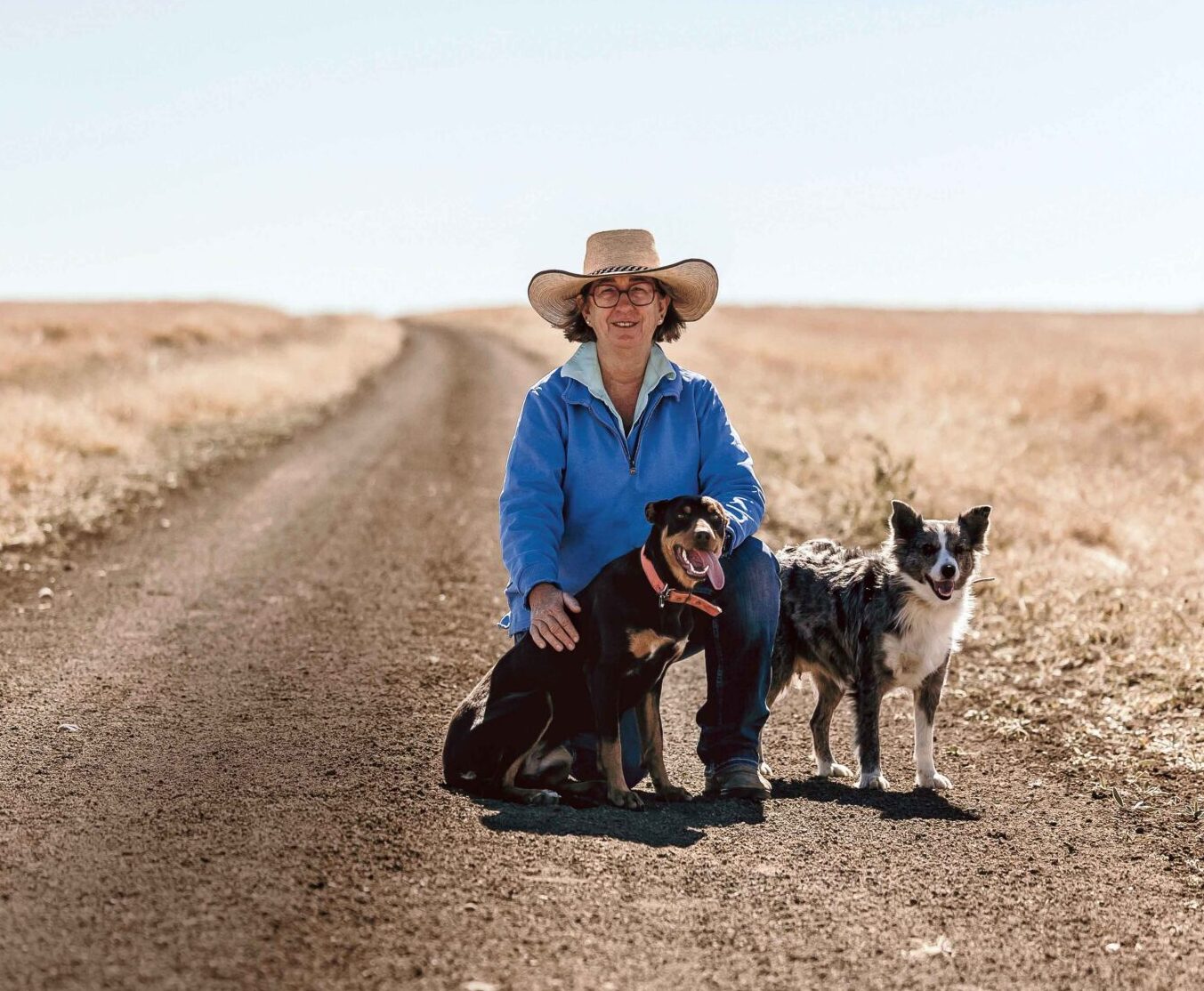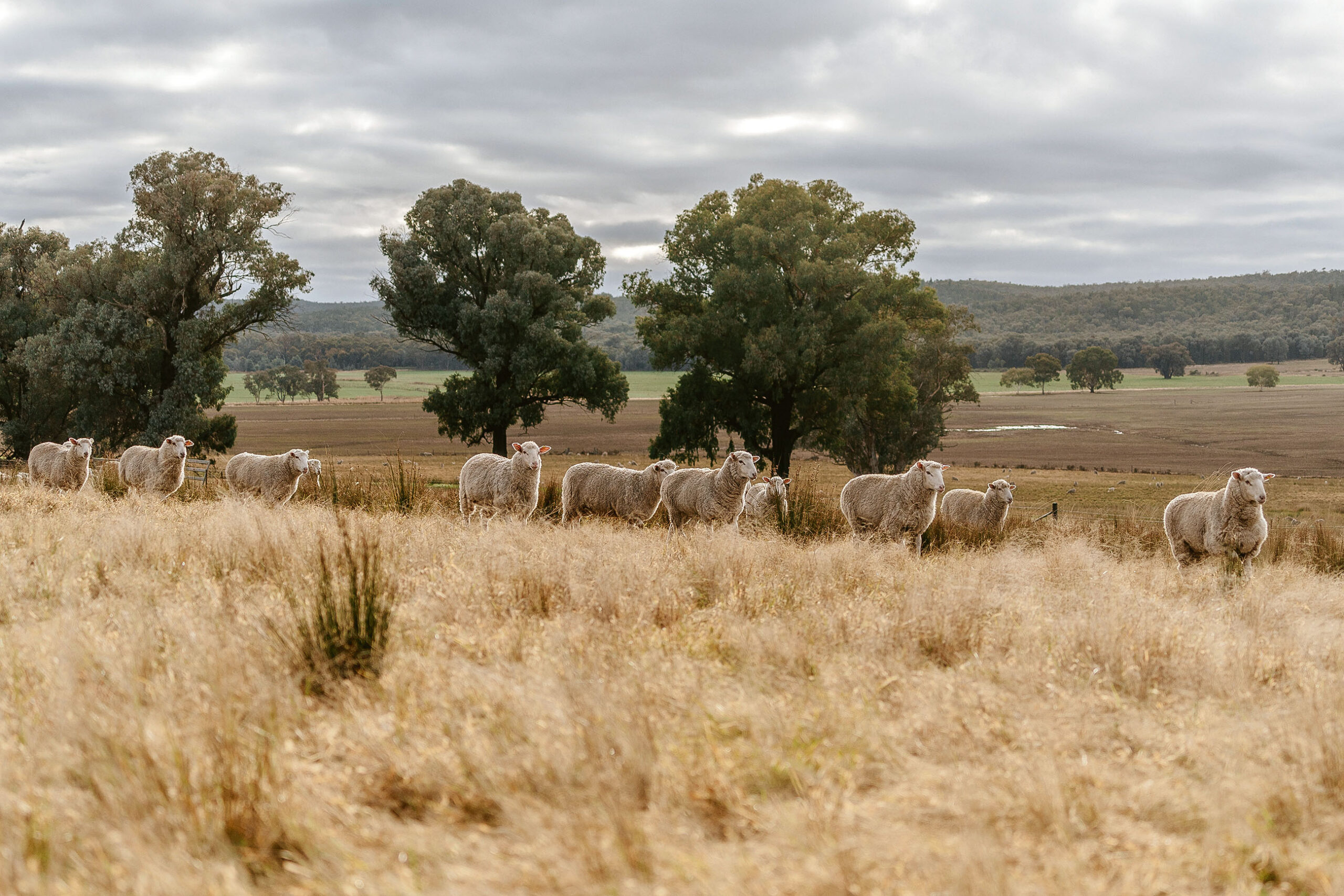PHOTOGRAPHY ABBIE MELLÉ
Kate Field stands among the flock on Leap Farm.
Sign up to our mailing list for the best stories delivered to your inbox.
Not only that, she also has a skincare line, Leapful, which harnesses the benefits of a nifty cheesemaking by-product.
WORDS AMANDA DUCKER PHOTOGRAPHY ABBIE MELLÉ
Though she has just worked a night shift at the Royal Hobart Hospital, Kate is a whirlwind of energy when we meet at her farm to talk about goat farming, cheesemaking and her new skincare range. Kate easily identifies her drivers and the places where her passions intersect.
“My purpose in life is to use my skills to make the world a better place,” she says. “I am passionate about human, animal and landscape health, and that I can effect positive change through my work across my two main disciplines.
“I see that they are incredibly linked: if you don’t eat nutritious food, you’ll be sick. If your animals aren’t well, they won’t produce nutritious food. If your soil is impoverished or the landscape doesn’t function properly, then your animals (or crops) won’t be healthy.”
Kate puts this ethos into practice daily at Leap Farm, a hilly 108 hectare property at Copping in the island state’s south east, 50 kilometres from the capital, Hobart. Kate and her ecologist husband Iain, who emigrated from the UK in 1996, bought Leap Farm in 2012. Keen cheesemakers, they identified their ethos before taking the next step.
“We needed to guarantee the quality of the milk and happiness and health of the animals, and the only way to do that was to have our own farm,” Kate says. They launched themselves into goat husbandry, dairying, cheesemaking and new parenting all at once, with son Hamish born in 2014 followed by Zoe (universally known as Pippi) two years later.
A decade later, it’s still go-go-go. With a 75 per cent workload as an emergency physician plus a national role overseeing education and training for the Australasian College for Emergency Medicine, Kate also found time to develop her Leapful range of skincare products. It was for this, her innovative use of whey waste from cheesemaking, that she won a Tasmanian Women in Agriculture Development Award in 2022.
Cheesemaking is a process of separating milk into curds and whey. At Leap Farm, cheeses are made by adding cultures to milk to metabolise lactose, producing lactic acid to activate the separation. When Iain takes the curds for cheesemaking, Kate takes the whey, which, at 70 per cent of the overall yield, is abundant. Before they struck on transforming the nutrient, mineral and antioxidant–rich by-product into skincare, they struggled to find a worthy use for it.
“It’s a biological substance, but unless you dehydrate it and turn it into whey powder, what?” she says. “You can give it to pigs and we did, and we made wine with it, but we kept coming back to skincare.”
By then, Kate had firsthand experience of its value as a skin restorer. “In winter, when we do not milk, we turn to farm maintenance, including fencing, and our hands get trashed because it’s cold and dry. We noticed that when spring came and milking resumed, Iain would have his hands back in the whey and they would heal.”
First up, Kate developed a base formulation using lactic whey and local olive oil, commissioning botanicals for three scent profiles from local horticulturist Angus Stewart, of Gardening Australia fame. Then she launched Leapful, promoting not just its local provenance but its naturally high levels of vitamins A and C, amino acids and retinol-binding beta-lactoglobulin. “The acidic pH of the lactic whey also discourages the bacterias that cause acne,” Kate says. “Daily Renewal face cream is now my best seller.”
Over the past decade, demand for Leap Farm’s Tongola cheeses has surged with the public and chefs, with numerous standing orders for its Curdy unsalted goat’s cheese from acclaimed eateries — including their local, Van Bone, and Hobart’s Peppina, Aloft, Templo and more.
In fact, demand for Tongola cheeses, which were launched by Swiss couple Hans Stutz and Esther Haeusermann in the Huon Valley in the late 1990s, was exceeding supply even before Kate and Iain took over the herd and the enterprise. A staggered transition began with Kate and Iain buying 18 Swiss Toggenburg goats as their foundation dairy herd. Two years later, these girls began producing milk for Tongola on Leap Farm. And Iain was pedalling fast to learn all he could about Swiss-style cheesemaking from Hans and Esther.
Leap Farm also produces goat meat. It was a hard sell 10 years ago, says Kate, but no longer, with repeat customers including Massimo Mele’s restaurant Peppina. “Massimo says his mum loves it as a really clean meat, not fatty like lamb, good for long, slow cooking,” Kate says. “Goat is the most-eaten red meat in the world. It’s lean and it’s one of the healthiest.”
Big-picture health is Kate Field’s guiding light, and she is also passionate about farming sustainably by improving the land and increasing biodiversity. In 2021, Leap Farm achieved carbon positive status, sequestering more than three times as much carbon as it emits. That’s equivalent to 60 average Australian household emissions, plus their own. When it comes to her embrace of regenerative farming for a better future, Kate is typically indefatigable.
“By ensuring that our landscapes are healthy, we ensure that we have a healthy planet, which is so important for now as well as future generations,” she says.
Kate Field talks about Leap Farm’s carbon-positive initiatives on past episodes of her podcast, The Curious Farmer. Order Leapful skincare at leapful.skin
Kate appears alongside other unsung rural heroines in Graziher’s 2025 Women of the Land diary. Produced in association with Rabobank, this beautiful hardcover diary features important country events and space for all your goals and to-do lists. Diaries can be purchased here.

In her youth, she struggled to find her place. Now, Louise Martin knows exactly where she needs to be: in Tambo, Queensland, making sure rural children get the education they deserve.

Writer and photographer Alexandra MacAlpine finds ways to hold onto moments of peace amid the busyness of station life.